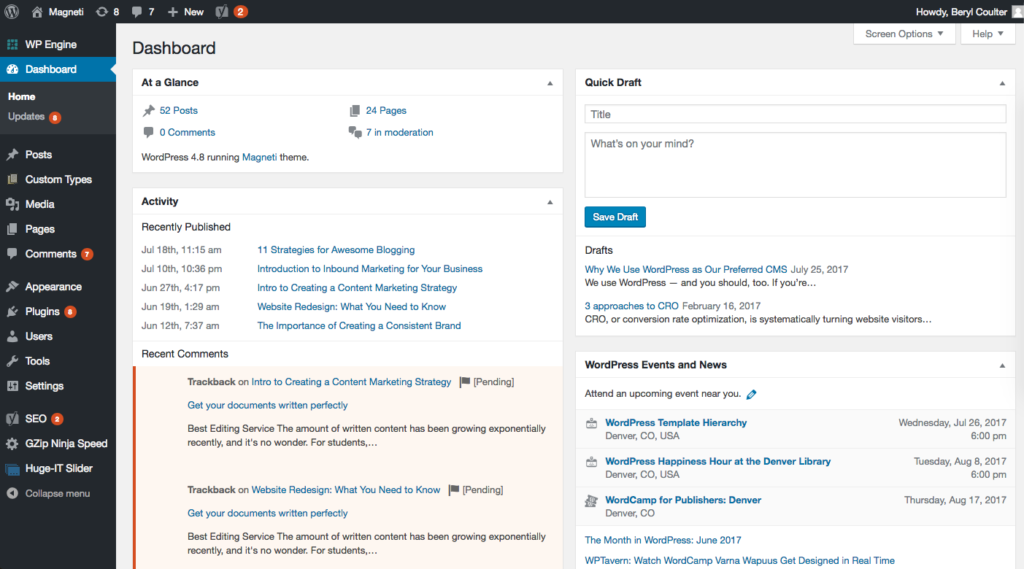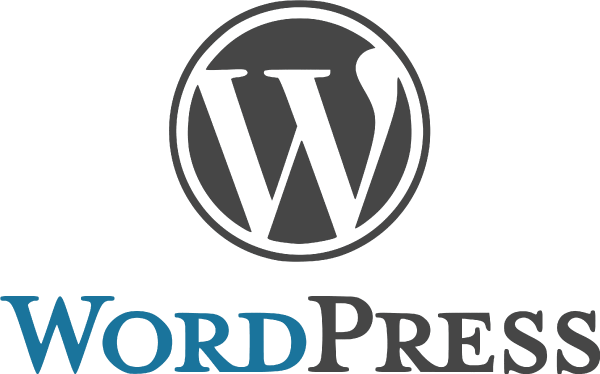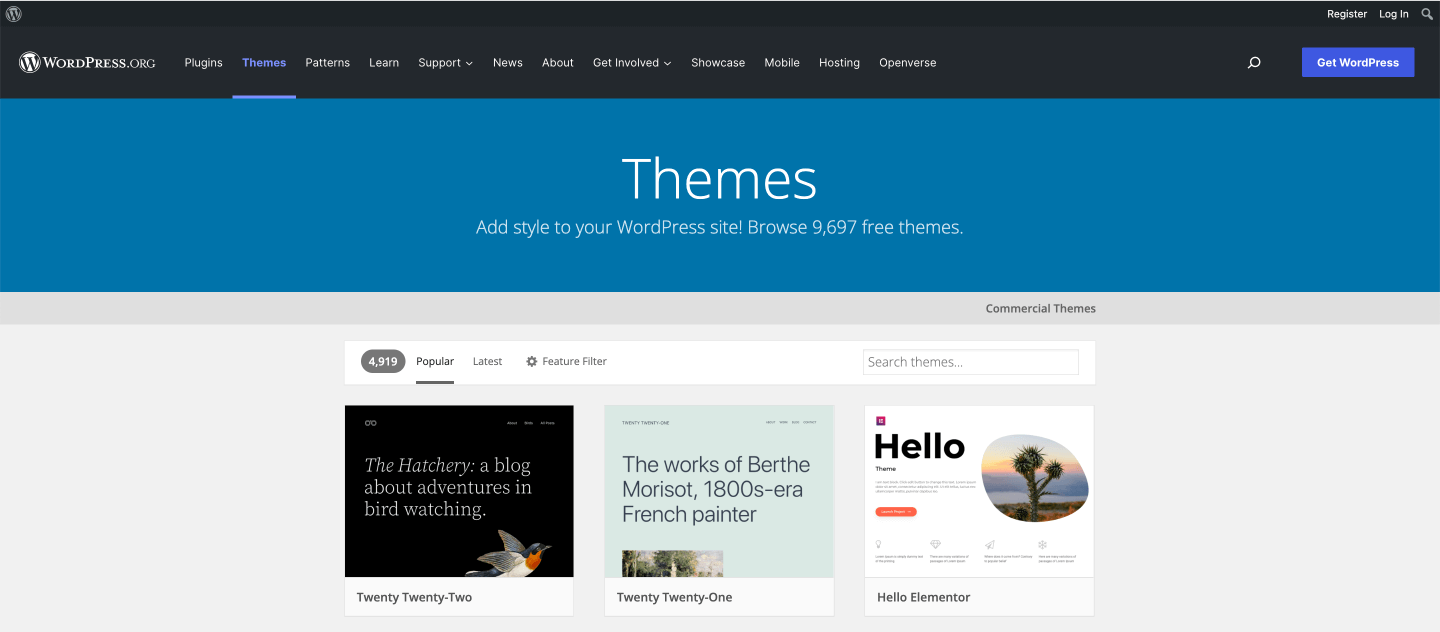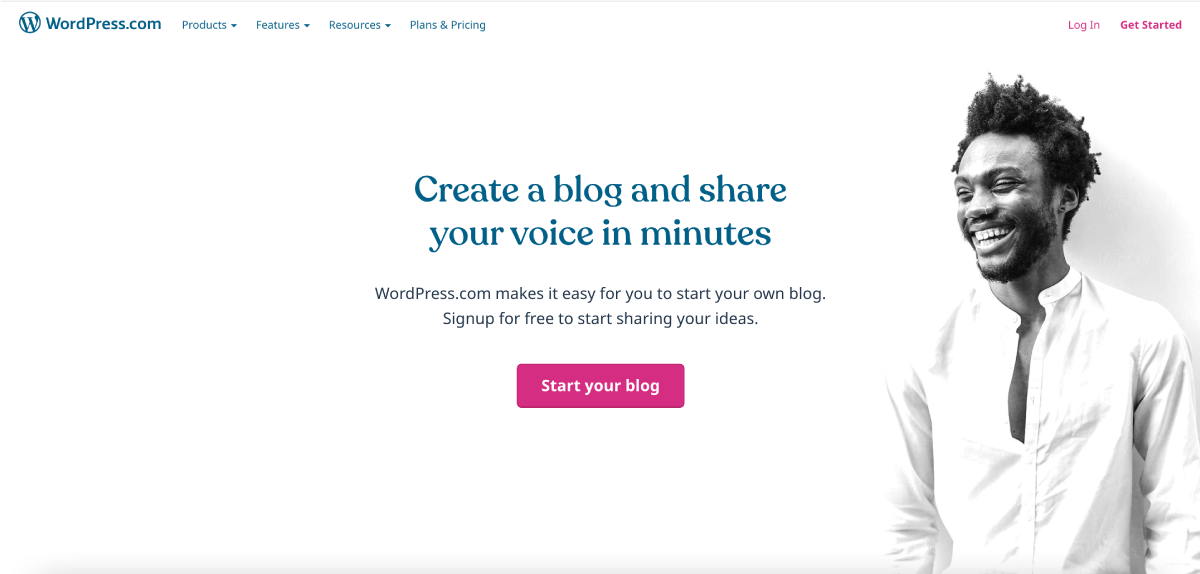Four years ago, we recommended WordPress as our Content Management System (CMS) of choice. For reasons you’ll soon see, it remains our top choice – for ourselves and our clients.
And for companies like Wired, Mashable, TechCrunch, and The Walt Disney Company. Here’s why.
What is WordPress?
WordPress is a free, open-source content management system. A CMS is essentially a software for building websites.
WordPress is simple for new users and uses basic programming language for the web, making it a popular option for a new site.
To keep things simple and clean, we use WordPress for our website and our clients’ website — and we’re not the only ones.
Other notable names using the WordPress CMS include: Sony, TechCrunch, Time Magazine, CNN, Disney, The Rolling Stones, Vogue, and more.
Curious what CMS a particular site is built on? Here’s a cool tool that will find out for you.
What Hasn’t Changed: Prevalence
Launched as a blogging platform in 2003, WordPress has become the most popular CMS by far. In 2017, 27.5% of sites were using WordPress. Today, that number has grown to 43% and 60 million sites. 409 million people view WordPress blogs monthly, and the number of monthly pageviews WordPress-powered blogs garner is 20 billion.
What’s New: Support and Security
With prevalence comes amazing product support and a vast user community that supports each other through forums.
Their support staff are actually called Happiness Engineers! Um, yes, please!
Of course, popularity also makes you a target. Websites are a growing threat vector in general, and running a site with such vulnerabilities as out-of-date plugins is like leaving your front door unlocked with a sign that says, “No one’s home – all are welcome!”
In the first half of last year alone, one popular firewall blocked 18.5 billion password attack requests on WordPress sites.
We love that WordPress is working to keep up with these and other emerging security threats and has evolved their tools extensively.
You used to be able to get away with rarely updating your site. While it was never wise, it’s more important than ever to stay on top of updates, and WordPress makes it easy.
 Sucuri is a free WordPress plug-in that monitors and scans your site and warns you if there are security plug-ins you need to update.
Sucuri is a free WordPress plug-in that monitors and scans your site and warns you if there are security plug-ins you need to update.
If you think you’ve been hacked, it conducts a more in-depth scan of your site and sends you an actionable report. This is essential when you have sensitive information, and let’s be honest – these days, who doesn’t?
By using this plugin (plus Sucuri’s upgraded service offerings) and hiding our login URL (which bots can easily guess or find), we’re able to prevent attacks.
It’s like hiding your spare key under the mat.
For more info on keeping your site safe, we recently wrote about the intersection between marketing and cybersecurity.
What Hasn’t Changed: Accessibility
It’s still free. It’s still open source. It’s still easy to use. The dashboard layout is consistent across sites and as navigable as ever, and the site portability factor is still there and still huge.
You still don’t have to be a developer to create and manage robust, professionally designed-looking sites.
And with nearly 10,000 free themes and 55,000 plug-ins that don’t require a developer who codes, the customization and integration possibilities are virtually endless.
What’s New: WordPress Themes and Plugins
Per afore-mentioned increasing security threats against WordPress, we prefer to build our own themes over using the free WordPress theme templates, which offer criminals an all-too-convenient attack portal.
We also prefer to limit plugin use. If you remember nothing else when it comes to plugins, remember these two things:
- Risk is inherent, often high
- Quality matters
If you find one you can’t live without, make sure it’s highly rated. Here’s a guide that walks you through how to check plugin ratings.
What Hasn’t Changed: WordPress Is a Grand Content Enabler
An outgrowth of its humble blogging beginnings, WordPress still offers the best blog functionality. And from the get-go, just as it comes, its easily crawl-able framework, fast site speeds, and navigation mean it’s well-positioned to be optimized for SEO.
What’s New: WordPress Optimization Advancements
If content is king, optimized content is czar. And with WordPress, Search Engine Optimization (SEO) is easier than ever, with advancements to the Yoast SEO plugin, which simplifies on-page (images, keywords, links, and meta descriptions) optimization.
Yes, it’s highly rated – great question!
In fact, it’s the highest rated WordPress plugin, with 4.8/5 out of 27,475 reviews, and the most frequently downloaded plugin in the entire plugin directory.
Among other things, it offers a readability score and analysis, SEO analysis, keyword optimization, meta description help, and an internal linking tool.
Should You Always Use WordPress?
There are situations where don’t recommend WordPress.
For example, for clients who don’t need content management or only need a simple landing page might find better luck with Squarespace, Wix, or a custom coded site.
If their site exists only for e-commerce, we would likely point them toward Shopify.
Shopify, while originally designed to help novices without coding skills launch and host an e-commerce site, has grown its templating system and CMS in the last few years and offers many more options than it used to.
Today, Shopify and WordPress are increasingly competing for market share, but WordPress remains the more obvious answer for a broader swath of users.
WordPress offers a persistent advantage over Shopify for those wanting to incorporate e-commerce into an existing site.
What Hosting Solution Should You Use with WordPress?
When it comes to hosting solutions, the landscape is fluid, but our top three favorites to work with (and that work well for most sites) are:
- WP Engine – Offers a great cost structure and unbelievable customer support that consistently goes above and beyond.
- Pantheon – One of the most developer-friendly platforms that offers a lot of flexibility and some advanced monitoring.
- Flywheel – Another option similar to WP Engine (and in fact who now owns Flywheel).
Your host can provide a barrier between you and the vulnerabilities inherent in any WordPress site. Some go further than others, and we find it’s worth investing in a host who can deal with these issues.
For an overview of further options, here is a comparison of top hosting solutions.
Whoever you choose, keep in mind that if you don’t have an internal IT team, it’s wise to go with a WordPress-friendly host.
What Domain Provider Should You Use with WordPress?
We don’t have a set domain standard now or official advice yet, but we’re leaning toward Cloudflare, who is a dominant domain name system security provider.
We consistently work with domains purchased and managed through common platforms like Bluehost, GoDaddy, DreamHost, and HostGator.
WordPress Is Here to Stay
WordPress’ popularity and flexibility is here to stay. If you plan to build a site on WordPress, you have a great chance of finding a developer who knows it.
Our team and their networks have deep experience in it, and we’ve had great success using it – for ourselves and our clients.
Want to learn more? Talk to a WordPress expert.
Here’s Why We Originally Recommended WordPress in 2017
If you’re building a new website, you’ve probably realized that there is a lot to consider. One of those things is how you’re going to create and manage your site. Should you use a CMS (like WordPress)?
A content management system can help in the management of your site. You could build a custom website without a CMS, but this often results in a website that’s hard to modify without the help of the original developer.
For the following reasons, you should consider creating your next website on WordPress:
WordPress is easy to use.
All WordPress sites have the same dashboard that allows you to access your site’s content (both pages and posts), manage plug-ins, edit navigation and more. The control panel is intuitive and well-organized. You can also create a staging environment within WordPress (WP) so you can test changes to your website without uploading them to the live site.

If you don’t have a developer or designer to build a custom WP site, there are thousands of free themes — check out the Theme Directory. You can alter the code of any theme. (At Magneti, we never use pre-built themes because some are sluggish, and we prefer a custom site, but they are available.) Many themes are already designed to be mobile responsive. Given the state of SEO — Google’s algorithm basically demands a responsive site so you don’t get heavily dinged — this is really important.
Then, there are thousands of free plug-ins at your disposal that don’t require a developer who codes. The plug-ins offer every special function you can imagine, from social sharing to image sliders. In order to keep your site running swiftly, it’s important to not install every plug-in out there — but using a select handful can be powerful for your site’s usability.
Just remember: a CMS doesn’t allow you to edit everything on your site. Based on the theme, you’ll probably have anywhere between 30 percent and 60 percent “editability” of the elements and content of your site. So don’t be surprised if you still need a web developer to make some of the changes you want.
WordPress is free and open source.
This means you can host your website on just about any shared hosting provider, and it’s free to use and edit. You’ll need to pay for your domain and for hosting, but both can be relatively inexpensive. Some hosts even give you a domain name for free with your hosting fees. We often host website on WP Engine, a capable host with fees starting at only $20 per month.
WordPress runs on a LAMP stack (Linux Apache MySQL PHP), which is one of the oldest, most common stacks on the web. Most shared hosting services use it. This makes your site transportable; if you needed, you can move your site from one host to another. If you have knowledge of a LAMP stack, you can download WP straight from WordPress.org — they say installation takes five minutes.
WordPress is the most popular CMS.
Globally, 27.5 percent of websites are built on WordPress — that’s over 75 million sites and 2.5 billion blog posts.* Developers who can work in WP are abundant, so you won’t be stuck with a single developer for your website’s entire existence.
* Data from 2017. For the most recent data on WordPress usage, see the Prevalence section up above.
WordPress has the best blog functionality of any CMS.
WordPress was originally created as a blog publishing platform. So, if your website has a blog (which it should), you will have access to innumerable plug-ins specific to blogging. And, it’s best for your business and for SEO to have your blog and website on the same site, which you can do with WP.
It’s also easy to manage blog subscriptions. You can integrate WordPress blogs with major email providers: MailChimp, Constant Contact, Emma, etc. We use a HubSpot-integrated form for our blog subscription — check it out here!
You can create any type of website on WordPress.
No matter your industry, you can create your website with WordPress. We’ve created sites for everything from membership to nonprofits. Here’s a broader list of what you can build with WP:
- E-commerce / B2C
- Blog website
- Membership
- Services / B2B
- Booking site (make appointments)
WordPress is optimized for SEO.
Out of the box, WP ranks relatively well in Google because of its easily crawl-able framework, fast site speeds and navigation. On top of that, there are SEO-specific plug-ins available — we recommend the Yoast SEO plugin — to further improve your search engine optimization. This particular plug-in gives suggestions and analyzes pages, inserts meta tags and link elements, creates a sitemap and allows you to choose a focus keyword for each page or post.
If you have questions on how we take WordPress sites from good to great, send us a message!
To learn more about WP in general, you can visit their website, which has tons of information on themes, capabilities, support, forums and more. Soon, you can be on your way to a stronger digital presence!




